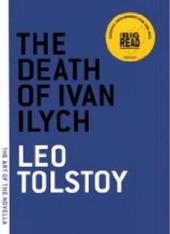
|
The Death Of Ivan Ilych
Paperback / softback
Main Details
| Title |
The Death Of Ivan Ilych
|
| Authors and Contributors |
By (author) Leo Tolstoy
|
| Series | Art of the Novel |
|---|
| Physical Properties |
| Format:Paperback / softback | | Pages:106 | | Dimensions(mm): Height 178,Width 127 |
|
| Category/Genre | Classic fiction (pre c 1945) |
|---|
| ISBN/Barcode |
9781933633541
|
| Classifications | Dewey:FIC |
|---|
| Audience | |
|---|
|
Publishing Details |
| Publisher |
Melville House Publishing
|
| Imprint |
Melville House Publishing
|
| Publication Date |
1 April 2008 |
| Publication Country |
United States
|
Description
Written eight years after the publication of Anna Karenina-a time during which, despite the global success of his novels, Leo Tolstoy renounced fiction in favor of religious and philosophical tracts-THE DEATH OF IVAN ILYCH represents perhaps the most keenly realized melding of Tolstoy's spirituality with his artistic skills.Here in a vibrant new translation, the tale of a judge who slowly comes to understand that his illness is fatal was inspired by Tolstoy's observation at his local train station of hundreds of shackled prisoners being sent off to Siberia, many for petty crimes. When he learned that the sentencing judge had died, Tolstoy was roused to consider the judge's thoughts during his final days-a study on the acceptance of mortality only deepened by the death, during its writing, of one of Tolstoy's own young children.The final result is a magisterial story, both chilling and beguiling in the fullness of its empathy, its quotidian detail, and the beauty of its prose, and is, as many have claimed it to be, one of the most moving novellas ever written.
Author Biography
Count Leo Nikolaevich Tolstoy displayed an extraordinary duality of character in a life filled with deep contradictions. He was born to an artistocratic Russian family on Sept. 9, 1828. His parents died when he was young, and he was raised by several female relatives. In 1844 he entered the University of Kazan, remaining there only three years. At the age of 23, Tolstoy joined the Russian Army and fought in the Crimean War. While still in the service, his first published story appeared, a largely autobiographical work called CHILDHOOD (1852). Tolstoy returned to his estate in 1861 and and established a school for peasant children there. In 1862, he married Sofia Behrs and gradually abandoned his involvement with the school. The next fifteen years he devoted to managing the estate, raising his and Sofia's large family, and writing his two major works, WAR AND PEACE (1865-67) and ANNA KARENINA (1875-77). During the latter part of this fifteen-year period, Tolstoy found himself growing increasingly disenchanted with the teachings of the Russian Orthodox Church. In the ensuing years, Tolstoy formulated for himself a new Christian ideal, the central creed of which involved nonresistance to evil; he also preached against the corrupt evil of the Russian state, of the need for ending all violence, and of the moral perfectibility of man. He continued to write voluminously, primarily nonfiction, but also other works, such as THE DEATH OF IVAN ILYICH (1886). In 1910, still unable to reconcile the differences in the lives led by the aristocracy and the simpler existence he craved, Tolstoy left the estate. He soon fell ill and was found dead on a cot in a remote railway station. He was buried on his estate at Yasnaya Pulyana.
Reviews"I wanted them all, even those I'd already read." -Ron Rosenbaum, The New York Observer "Small wonders." -Time Out London "[F]irst-rate...astutely selected and attractively packaged...indisputably great works." -Adam Begley, The New York Observer "I've always been haunted by Bartleby, the proto-slacker. But it's the handsomely minimalist cover of the Melville House edition that gets me here, one of many in the small publisher's fine 'Art of the Novella' series." -The New Yorker "The Art of the Novella series is sort of an anti-Kindle. What these singular, distinctive titles celebrate is book-ness. They're slim enough to be portable but showy enough to be conspicuously consumed-tiny little objects that demand to be loved for the commodities they are." -KQED (NPR San Francisco) "Some like it short, and if you're one of them, Melville House, an independent publisher based in Brooklyn, has a line of books for you... elegant-looking paperback editions ...a good read in a small package." -The Wall Street Journal
|